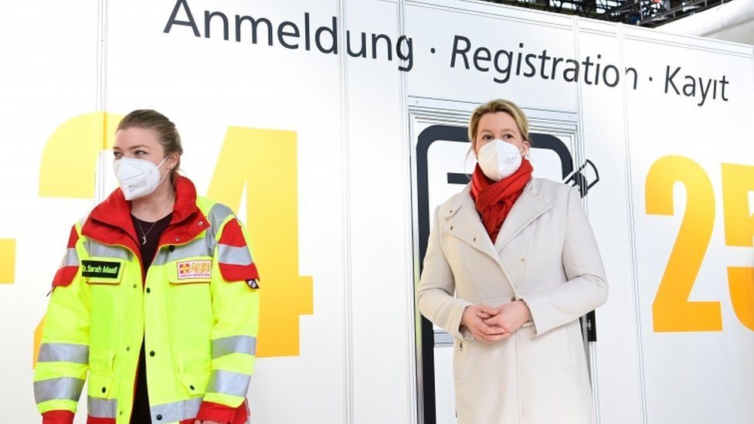German leaders have postponed a summit on extending the vaccine rollout as they await confirmation from the EU's medicines regulator that the Oxford-AstraZeneca drug is safe to use.
Germany is among a number of European countries that have suspended its use but Vice-Chancellor Olaf Scholz said he was hopeful it could be used again.
The EU regulator has again insisted the drug's benefits outweigh any risks.
The German decision has been criticised by some politicians and doctors.
Emer Cooke, executive director of the European Medicines Agency, said the EMA was still "firmly convinced" of the benefits of the AstraZeneca drug, and she pointed out that blood clots highlighted by some countries were relatively common in the general population. The main question was whether it was a real side-effect of the vaccine or a coincidence, she said.
The agency's safety committee will further review the latest evidence and report back on Thursday. Experts from the World Health Organization (WHO) were also meeting on Tuesday but spokesman Christian Lindmeier stressed there was "no evidence" that the incidents were linked to the vaccine.
The WHO has urged countries not to pause their vaccinations.
In the UK, more than 11 million people have already received at least one dose of the AstraZeneca vaccine and there has been no sign of excess deaths or blood clots occurring.
What reaction has there been in Germany?
Germany has so far used 1.6 million doses of the AstraZeneca vaccine, considered second only to the Pfizer-BioNTech drug in importance to the national rollout.
The planned meeting of federal and state leaders will now take place after the EMA decision, and they are expected to back the involvement of a national network of family doctors' surgeries from April, which officials hope will then enable 20 million vaccinations per month.
German infections are growing "exponentially", with cases up by 20% in the past week, an expert from the RKI public health agency warned on Tuesday.
There have been seven cases of cerebral blood clots (cerebral sinus venous thrombosis, which is very rare) in recently vaccinated people in Germany, three of them fatal.
The government's decision to suspend the vaccine on Monday was criticised by Karl Lauterbach, an epidemiologist and health spokesman for the centre-left Social Democrats, who said while it was justifiable, it was also political.
"I would even now get vaccinated with the AstraZeneca. Based on the incidents we now know, the benefits of vaccination significantly outweigh the risks, particularly for the elderly," he told Deutschlandfunk radio.
A Free Democrat spokeswoman said the decision had set back the entire vaccination rollout. Greens health expert Janosch Dahmen argued that authorities could have provided detailed information about "manageable risk" and continued using the drug.
Latest Stories
-
Kwame Boafo Akuffo: Court ruling on re-collation flawed
10 minutes -
Samuel Yaw Adusei: The strategist behind NDC’s electoral security in Ashanti region
12 minutes -
I’m confident posterity will judge my performance well – Akufo-Addo
24 minutes -
Syria’s minorities seek security as country charts new future
1 hour -
Prof. Nana Aba Appiah Amfo re-appointed as Vice-Chancellor of the University of Ghana
1 hour -
German police probe market attack security and warnings
1 hour -
Grief and anger in Magdeburg after Christmas market attack
1 hour -
Baltasar Coin becomes first Ghanaian meme coin to hit DEX Screener at $100K market cap
2 hours -
EC blames re-collation of disputed results on widespread lawlessness by party supporters
2 hours -
Top 20 Ghanaian songs released in 2024
3 hours -
Beating Messi’s Inter Miami to MLS Cup feels amazing – Joseph Paintsil
3 hours -
NDC administration will reverse all ‘last-minute’ gov’t employee promotions – Asiedu Nketiah
3 hours -
Kudus sights ‘authority and kingship’ for elephant stool celebration
3 hours -
We’ll embrace cutting-edge technologies to address emerging healthcare needs – Prof. Antwi-Kusi
4 hours -
Nana Aba Anamoah, Cwesi Oteng special guests for Philip Nai and Friends’ charity event
4 hours

